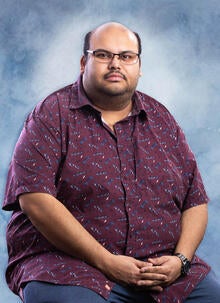Introducing Anirban
 Anirban Banerjee (he/him) obtained his Bachelors degree in Biotechnology from the Heritage Institute of Technology (an affiliate of the West Bengal University of Technology) in Kolkata, India. After arriving in Canada, he completed a Master of Science degree in Microbiology and Immunology at the University of Saskatchewan, followed by a PhD in Biology at the University of Western Ontario. He has held two appointments as a postdoctoral fellow in the Department of Chemical Engineering at the University of Waterloo. While here, he has also served as a Lecturer, teaching three undergraduate courses in Biology and Biomedical Engineering. He is an award-winning instructor, with teaching awards from multiple Canadian Universities.
Anirban Banerjee (he/him) obtained his Bachelors degree in Biotechnology from the Heritage Institute of Technology (an affiliate of the West Bengal University of Technology) in Kolkata, India. After arriving in Canada, he completed a Master of Science degree in Microbiology and Immunology at the University of Saskatchewan, followed by a PhD in Biology at the University of Western Ontario. He has held two appointments as a postdoctoral fellow in the Department of Chemical Engineering at the University of Waterloo. While here, he has also served as a Lecturer, teaching three undergraduate courses in Biology and Biomedical Engineering. He is an award-winning instructor, with teaching awards from multiple Canadian Universities.
Outside of academics, Anirban is also a professional Eastern Semi-classical vocalist. He has won state and national music competitions, appeared in radio and television programs in India, and performed in multiple Canadian cities. Visit his website to learn more about his musical career.
Teaching at Waterloo
The University of Waterloo is the first place that he has gotten to be a lecturer, but Anirban has always wanted to be a teacher. “Illuminating fresh minds is what I enjoy doing. Explaining concepts from scratch and taking the effort to deliver complex ideas in a simple way is what I love..” Considering himself to be a lifelong learner, he believes the world and all the people around us are teaching us things every day, so long as we keep an open and unbiased mind. The beauty of teaching, he explains, is that the more we share knowledge, the more we gain. “When you see the smile [on the] faces of the students in front of you…after they understand a concept and can relate to it, I think there is no better satisfaction for a teacher.”
Anirban puts this teaching philosophy into action by emphasizing the importance of preparation and communication for teaching at Waterloo. After being assigned a course with a LEARN component (fully or partially online), for example, he typically requests access to previous LEARN course shells to better understand the framework and structure of that course. He also reaches out to professors who have taught the course in the past for advice and assistance. These strategies allow him to benefit from the experience of his peers to develop a stronger course design and improve his teaching skills.
The strength of this approach is that while every instructor will have gaps in their knowledge or areas for improvement, these can always be addressed by reaching out for support from peer and colleagues. No one needs to figure things out completely on their own, because at Waterloo there will always be a community of support to draw upon.
Beyond his preparation for specific courses, Anirban also continues to pursue his love of teaching by learning more about different aspects and varieties of pedagogy. In 2023, he attended the Teaching and Learning Conference at the University of Waterloo, where he was moved to hear about the spiritual aspects of indigenous learning. He remembers the striking similarities between indigenous pedagogy and the teaching and learning-related beliefs and traditions of his homeland and reflects on what it means to him. “The idea of holistic teaching and learning is something I have always looked up to, and my experience here at the University of Waterloo was able to nurture this.”
Advice to postdocs
Anirban recommends that all postdocs be open to teaching in addition to the research they perform at Waterloo. Teaching is an enriching process that helps solidify your understanding of a subject, while helping you develop the skills to communicate ideas effectively. And it is also a way of engaging with other philosophies and cultures, as we strive to learn from and incorporate the strengths of other traditions into our own practices.
Related Resources
- The Centre for Teaching Excellence has resources, tools, and programs to support your teaching at Waterloo and help you develop a wide variety of pedagogical skills.
- Instructional Technologies and Media Services (ITMS) provides technical support with learning technologies and platforms, classroom presentations, digital collaboration, and other tools and services.
- You can find accessibility information for faculty and staff to help provide guidance for how best to accommodate students.
- For instructors working with LEARN, the Waterloo LEARN Help page can help support your teaching and answer any questions you might have.









